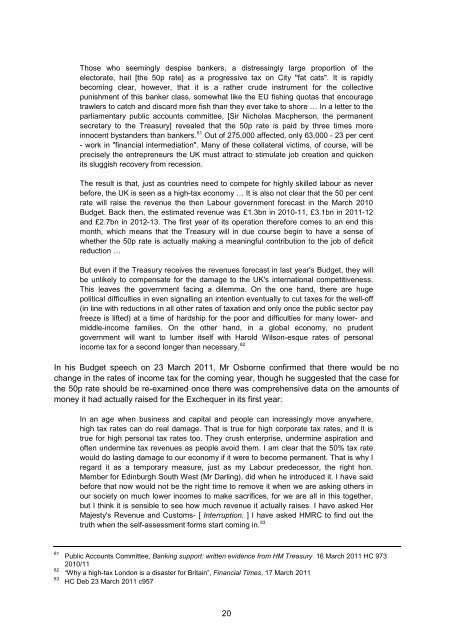Income tax: the additional 50p rate ( PDF, 41 pages ... - Parliament
Income tax: the additional 50p rate ( PDF, 41 pages ... - Parliament
Income tax: the additional 50p rate ( PDF, 41 pages ... - Parliament
You also want an ePaper? Increase the reach of your titles
YUMPU automatically turns print PDFs into web optimized ePapers that Google loves.
Those who seemingly despise bankers, a distressingly large proportion of <strong>the</strong><br />
electo<strong>rate</strong>, hail [<strong>the</strong> <strong>50p</strong> <strong>rate</strong>] as a progressive <strong>tax</strong> on City "fat cats". It is rapidly<br />
becoming clear, however, that it is a ra<strong>the</strong>r crude instrument for <strong>the</strong> collective<br />
punishment of this banker class, somewhat like <strong>the</strong> EU fishing quotas that encourage<br />
trawlers to catch and discard more fish than <strong>the</strong>y ever take to shore … In a letter to <strong>the</strong><br />
parliamentary public accounts committee, [Sir Nicholas Macpherson, <strong>the</strong> permanent<br />
secretary to <strong>the</strong> Treasury] revealed that <strong>the</strong> <strong>50p</strong> <strong>rate</strong> is paid by three times more<br />
innocent bystanders than bankers. 81 Out of 275,000 affected, only 63,000 - 23 per cent<br />
- work in "financial intermediation". Many of <strong>the</strong>se collateral victims, of course, will be<br />
precisely <strong>the</strong> entrepreneurs <strong>the</strong> UK must attract to stimulate job creation and quicken<br />
its sluggish recovery from recession.<br />
The result is that, just as countries need to compete for highly skilled labour as never<br />
before, <strong>the</strong> UK is seen as a high-<strong>tax</strong> economy … It is also not clear that <strong>the</strong> 50 per cent<br />
<strong>rate</strong> will raise <strong>the</strong> revenue <strong>the</strong> <strong>the</strong>n Labour government forecast in <strong>the</strong> March 2010<br />
Budget. Back <strong>the</strong>n, <strong>the</strong> estimated revenue was £1.3bn in 2010-11, £3.1bn in 2011-12<br />
and £2.7bn in 2012-13. The first year of its operation <strong>the</strong>refore comes to an end this<br />
month, which means that <strong>the</strong> Treasury will in due course begin to have a sense of<br />
whe<strong>the</strong>r <strong>the</strong> <strong>50p</strong> <strong>rate</strong> is actually making a meaningful contribution to <strong>the</strong> job of deficit<br />
reduction …<br />
But even if <strong>the</strong> Treasury receives <strong>the</strong> revenues forecast in last year's Budget, <strong>the</strong>y will<br />
be unlikely to compensate for <strong>the</strong> damage to <strong>the</strong> UK's international competitiveness.<br />
This leaves <strong>the</strong> government facing a dilemma. On <strong>the</strong> one hand, <strong>the</strong>re are huge<br />
political difficulties in even signalling an intention eventually to cut <strong>tax</strong>es for <strong>the</strong> well-off<br />
(in line with reductions in all o<strong>the</strong>r <strong>rate</strong>s of <strong>tax</strong>ation and only once <strong>the</strong> public sector pay<br />
freeze is lifted) at a time of hardship for <strong>the</strong> poor and difficulties for many lower- and<br />
middle-income families. On <strong>the</strong> o<strong>the</strong>r hand, in a global economy, no prudent<br />
government will want to lumber itself with Harold Wilson-esque <strong>rate</strong>s of personal<br />
income <strong>tax</strong> for a second longer than necessary. 82<br />
In his Budget speech on 23 March 2011, Mr Osborne confirmed that <strong>the</strong>re would be no<br />
change in <strong>the</strong> <strong>rate</strong>s of income <strong>tax</strong> for <strong>the</strong> coming year, though he suggested that <strong>the</strong> case for<br />
<strong>the</strong> <strong>50p</strong> <strong>rate</strong> should be re-examined once <strong>the</strong>re was comprehensive data on <strong>the</strong> amounts of<br />
money it had actually raised for <strong>the</strong> Exchequer in its first year:<br />
In an age when business and capital and people can increasingly move anywhere,<br />
high <strong>tax</strong> <strong>rate</strong>s can do real damage. That is true for high corpo<strong>rate</strong> <strong>tax</strong> <strong>rate</strong>s, and it is<br />
true for high personal <strong>tax</strong> <strong>rate</strong>s too. They crush enterprise, undermine aspiration and<br />
often undermine <strong>tax</strong> revenues as people avoid <strong>the</strong>m. I am clear that <strong>the</strong> 50% <strong>tax</strong> <strong>rate</strong><br />
would do lasting damage to our economy if it were to become permanent. That is why I<br />
regard it as a temporary measure, just as my Labour predecessor, <strong>the</strong> right hon.<br />
Member for Edinburgh South West (Mr Darling), did when he introduced it. I have said<br />
before that now would not be <strong>the</strong> right time to remove it when we are asking o<strong>the</strong>rs in<br />
our society on much lower incomes to make sacrifices, for we are all in this toge<strong>the</strong>r,<br />
but I think it is sensible to see how much revenue it actually raises. I have asked Her<br />
Majesty's Revenue and Customs- [ Interruption. ] I have asked HMRC to find out <strong>the</strong><br />
truth when <strong>the</strong> self-assessment forms start coming in. 83<br />
81<br />
82<br />
83<br />
Public Accounts Committee, Banking support: written evidence from HM Treasury 16 March 2011 HC 973<br />
2010/11<br />
“Why a high-<strong>tax</strong> London is a disaster for Britain”, Financial Times, 17 March 2011<br />
HC Deb 23 March 2011 c957<br />
20

















